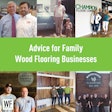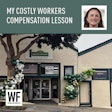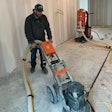

Tony Rosso, owner of Hardwood Floors Centre in Toronto, thought he had done a good job making his business secure. Then one busy day in 1997, a man drove a truck to the back door of Rosso's business, loaded the truck with hardwood, and took off. Looking confident and bold, the "customer" told Rosso's employees he was in a hurry, knew the boss, and would drive around to the front to pay for the order. One of the employees actually helped the friendly man load his truck. The thief, though, had not counted on one thing. Rosso had trained his employees to write down the license plate numbers of cars and trucks arriving at the back door. "If you are suspicious, write it down," Rosso had instructed. The police quickly arrested the thief and he was sent to jail. Rosso got his costly shipment of hardwood flooring back.
"We were lucky that time, but every day I worry that someone will come to our back door and actually get away with a shipment," Rosso says. "Large back doors can put a hardwood flooring retailer out of business, because the markup is so small in our industry. One box goes missing and $120 to $150 disappears."
Rosso's brush with crime shows that in today's business world, hardwood flooring retailers must not only be concerned with selling their products, but also with protecting them. Recent press reports show that crime in the retail sector has become much more brazen. In Palm Beach County, Fla., for example, thieves chained a telephone pole to their truck and used it as a battering ram to break into a store that had closed for the evening. That's just a variation on a common technique known as "ram raiding," in which thieves drive trucks through storefronts, walk in, remove merchandise and speed away.
Nonetheless, hardwood flooring retailers can take steps to protect their businesses against the threat of crime.
Assess the risk
Formulate a security plan that will help you determine what resources you want to protect. For example, what valuable data do you store in your computer system and what security risks are associated with it.
"Without a risk assessment, you will never know what you have of value," says Jim Dion, a senior partner in the Chicago-based J.C. Williams Group and a consultant to the retail industry. "A risk assessment allows retailers to make wise and practical security decisions."
A risk assessment may show you that an employee's work station should not be considered a vital company resource unless that employee is someone who stores vital information locally. On the other hand, your customer database holds tremendous value, which means you should spend more time and effort devising solid protection for it against intrusion and sabotage.
"It's good to have a well-thought-out course of action to deal with potential security problems," says Kevin Pennington, president of Pennington Hardwoods in Clarksville, Ind. "It could save you a lot of time and trouble down the road."
Bring in a computer consultant to help you with your security plan, and the bill could run about $1,000 a day, sources say, but they also add that hardwood flooring retailers can conduct the same study themselves, if they are willing to take the time.
"Make a judgement call regarding cost-effectiveness," says Sebastian Charroud, a business and Internet consultant based in Rock Hill, S.C. "Look at the likelihood of the threat and the value of your resources and make your best call."
Protect against the threat
From whom do you need to protect your business's resources. Contrary to conventional wisdom, your biggest threat may not be the thief who drives a truck to your back door or a crafty hacker lurking in cyberspace. In fact, studies indicate that an estimated 67percent of all data theft and damage to systems is done by a company's own employees — perhaps one paid by a competitor to get your information, or a disgruntled worker denied a raise.
So ask yourself another important question: Who should be allowed to use your store's vital resources?
In terms of computer access, Dion advises dealers to create several classifications, based on the level of access the company allows. Evaluate each and every employee's needs, and assign staffers to appropriate user classes. For example "user class one" would allow an employee — say, a store manager — to have access to the entire computer resources of the store. The lowest user class, which would allow for the most limited access to computer resources, can be assigned to a clerk who has no need for access to the store's computer system.
The bottom line: Some employees only need e-mail access to the Internet, while others may also need access to the company's database.
Rosso suggests giving an employee in your store the responsibility of granting employee access and approving Internet use. "This person would also have unlimited access to all computer and Internet resources," he says.
Meanwhile, pre-employment screening should be an integral part of a company's security policy.
"It will cost about $50 to do a background check on a prospective employee," Dion says. "You can do a lot of screening yourself. For example, you can call around to verify references."
Educate employees
The next step is to make all employees aware of the security problems and educate them through memos and meetings about what they can do to protect the business.
"If you don't educate employees, they're going to look at company security as something that's going to slow them down," says Robert Kulhawy, CEO of Calgary-based HFI Flooring Inc., which has showrooms in six Canadian cities and sales offices in 10 others. "The security issue can be covered in a one-hour meeting and, if done right, it will change thec ompany's whole posture toward the problem."
HFI has developed a basic checklist of store security procedures, and each employee is given a copy and is expected to be familiar with its content. "We have periodic meetings with our staff where we review the list and reiterate the importance of store security," Kulhawy says.
Rosso doesn't use a checklist, but he has regular meetings with his employees that focus on security. "I stress to them that, in doing business at the back door, be sure the flooring is paid for in full and that it's stamped before it's loaded into anyone's vehicle," he says. "In one of our security meetings, I discovered that a number of contractors were offering my employees cash for materials."
Be proactive
Just guarding against the possibility of employee theft is not enough. Adopt policies that will make your employees feel more like part of the business.
"Allowing employees to benefit from your business will be the biggest incentive you can use to keep them from stealing," says Pennington.
Kulwahy adds, "I believe in giving employees a certain percentage of the gross profits or shares in the business so that everybody has a stake in the company. If somebody steals from the company, everybody makes less money. A profit-sharing plan will cut down on crime. Who wants to steal from himself."
Monitor the store
Electronic surveillance is a must in today's retail world. Use a fake camera, if the thought of an all-pervasive store surveillance system makes you uncomfortable. Studies have shown that the mere presence of surveillance equipment, real or fake, can deter retail crime.
Electronic surveillance equipment doesn't come cheap. Rosso recently installed surveillance equipment at his store at a cost of $15,000. "We called a couple of people who were specialists in surveillance systems and told them what our security concerns were," he says. "In suggesting the type of equipment they thought we needed, the two consultants gave us the same recommendation, so obviously they were honest."
Don't let your security guard down, though, simply because you have installed surveillance equipment. "Even if you get a picture on videotape of someone stealing, putting that person in jail is still a problem," Dion says. "It's often difficult to identify the person as a thief. Then you have to prove that he left the store with merchandise."
Network
To deter crime, use the resources that your community has to offer. Check the Better Business Bureau before doing business with another company. Get to know other retailers in your neighborhood and try to keep each other informed about local developments relating to crime. Does your community have a retail crime prevention organization that provides support activities, publishes crime prevention literature, and gives security seminars and advice. Check it out.
And don't forget the local police force. "Almost every local police force has an officer who will come and talk to your employees," Dion says. "Police can be particularly helpful in giving advice on legal matters, such as how to make a citizen's arrest and what you can and can't do in detaining a customer."
The most important thing: Make business security a priority. As Kulhawy puts it: "Don't look at your inventory as a pallet of hardwood flooring. Look at it as $3,000 sitting in your warehouse. Don't look at your sanding machine as a replaceable piece of equipment, but as a $7,000 pile of cash. Look at your business that way, and you begin to realize how importan tsecurity is."
Nine Ways to Minimize Retail Theft
- Move cash registers from the back of the store to the front and, if possible, in a position where your cashiers can see and be seen from the street.
- Leave an interior light on all night.
- Install a signal alarm on entrances to alert your staff when a customer has entered.
- Increase the store’s visibility from outside by removing posters and signs that block the view from windows.
- Don’t tag your keys with the name of your business.
- Leave cash registers empty and open after hours to deter thieves.
- Keep shelving low enough so that staff can monitor the store more easily. If necessary, elevate the floor behind the till and install mirrors.
- Use exterior lighting to increase visibility in front of the store and its entrances.
- Keep doors closed until you are ready to do business, and don’t start counting receipts until the store is locked.

































